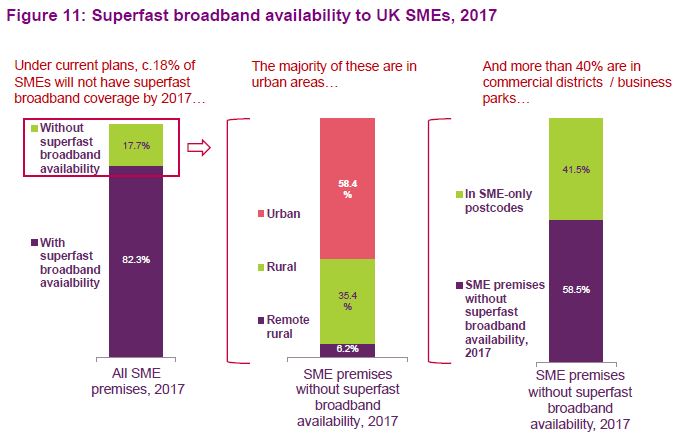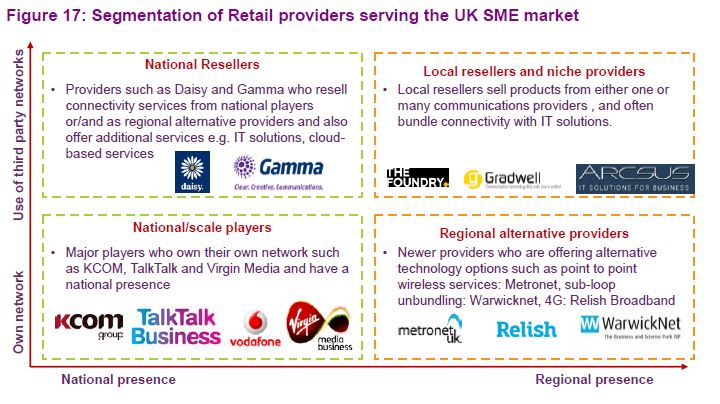Ofcom’s action plan for broadband services for SMEs
Ofcom yesterday launched an action plan for improving the broadband services that are available to the UK’s small and medium sized enterprises (SMEs). Whilst they found that the vast majority of SMEs are satisfied with the communications and are well catered for, they did discover a significant minority who had less favourable experiences. Ofcom highlighted four issues that they feel need more attention; the availability of superfast broadband, a concentrated retail market structure, concerns around quality of service, and SMEs struggling to navigate the market.
Superfast broadband availability
Ofcom rightly noted that reliability can be as important as headline bandwidth to some SMEs but that as firms move towards more bandwidth intensive applications – which can also lead to the biggest boosts in productivity – they will need better access to superfast broadband. They also highlighted the problem that mobile not-spots cause to businesses.
Ofcom found that overall access to superfast was lower for business premises than domestic and that even with the ongoing commercial and BDUK funded deployments, this is likely to continue into the future.
Ofcom suggested that Government could make more explicit reference to business premises in its coverage targets for BDUK schemes as well as continuing to push for rollout of ultrafast connectivity to all premises. Further they also echoed the proposal contained in their Infrastructure 2014 Report for a Universal Service Obligation whilst saying that they would continue to collect information on this.
It will be interesting to see how this plays into any decision that the Government takes on continuing, or expanding, its SME Voucher Connection scheme which is currently due to finish next year.
Quality of Service
Ofcom’s research found that 42% of SME internet users reported issues around their internet connection with 29% citing poor service reliability as an issue. Whilst the majority of complaints were issues in the consumer domain (i.e. faulty WiFi routers or software), around a third were in the network. Ofcom state that some of these were due to poor service levels delivered at the wholesale level by Openreach which is subject to existing and ongoing interventions. However, Ofcom also found that some communication providers were not passing on Openreach’s offer of enhanced service levels. Ofcom have said that they are considering the best remedy for this problem under the Digital Communications Review.
Market Structure
Ofcom acknowledged that the business market is different in composition to the residential market with BT having, on some estimates, around a 50% share of SME fixed-line revenues. Ofcom found though that BT are facing a growing level of competition from a range of companies:
Despite the future success of these providers remaining uncertain, Ofcom, who will naturally continue to monitor the market, concluded that there were “positive indications of growing competitive choice… SMEs???.
SMEs’ ability to navigate the communication markets
Ofcom found that SMEs were generally uncertain about the market and found tariffs and offers difficult to compare – partly because of the complexity of the communication services they require and a lack of in-house expertise. To help remedy this, Ofcom have announced that they will expand their recently launched business portal and continue to monitor switching by SMEs. They also announced they would seek to develop a new Code of Practice with industry that would be similar to the current Broadband Speeds Code that covers consumers, with BT, TalkTalk and Virgin Media agreeing to do so.
Ofcom recognises that the BSG, and our sponsors, have played a role in increasing the focus on SMEs and we are determined to continue to do so – including with our forthcoming report on small business connectivity requirements.






